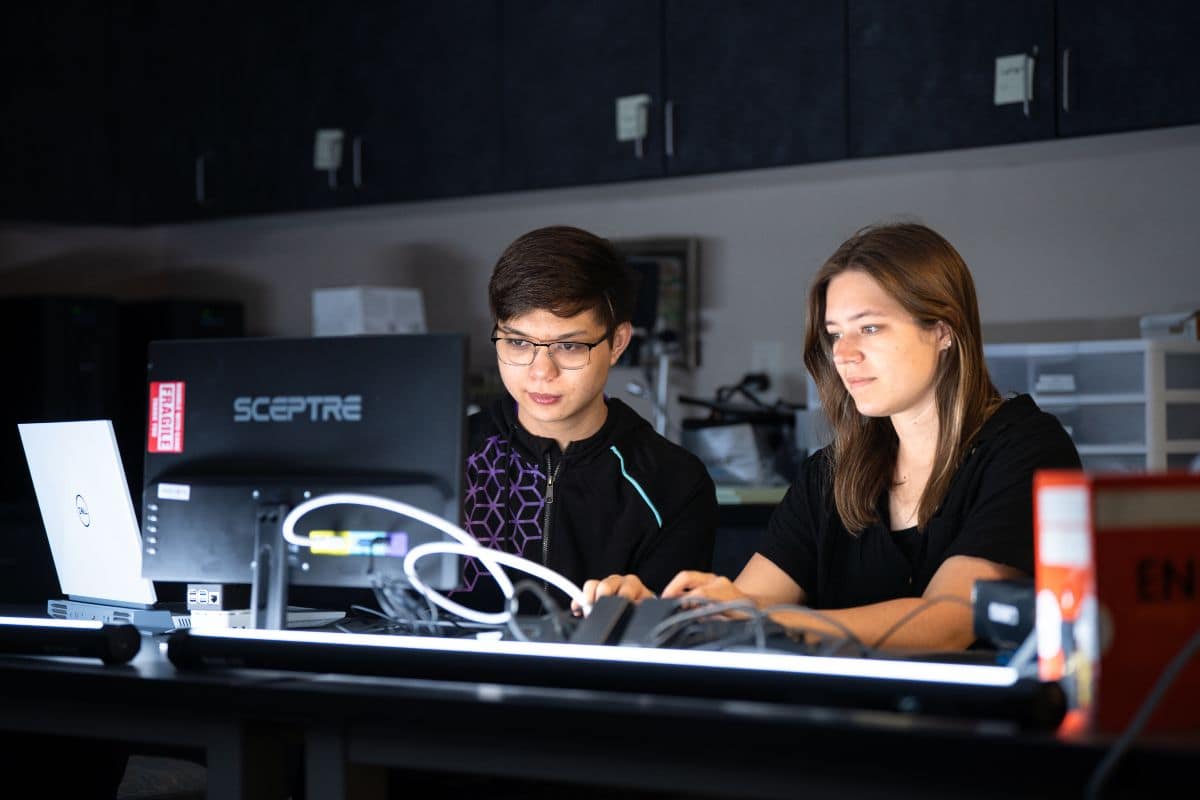Students Strengthen Their Cyber Fitness in ‘Cyber Gym’ Research Center

Embry-Riddle Aeronautical University has been preparing students for careers in cybersecurity for over a decade, with bachelor’s and master’s degree programs available. Expanding on that mission, the university recently unveiled its Cyber Gym Makerspace, which is offering students the ability to further develop their skills through undergraduate and graduate research projects.
“The Cyber Gym enables project-based learning, where students can experiment with different approaches and develop tangible solutions,” said Dr. Krishna Sampigethaya, associate professor and chair for the Department of Cyber Intelligence and Security at Embry-Riddle’s Prescott Campus. “The facility combines the hands-on nature of traditional makerspaces with a focus on cyber education.”
As a hands-on, “do-it-yourself’ laboratory open to all cybersecurity students, the Cyber Gym will serve as a bridge connecting them to the college’s industry partners, Sampigethaya added.
“The industry gets a firsthand look at the caliber of talent emerging from the university’s programs,” said Dr. Sampigethaya. “Hence, the Cyber Gym becomes a catalyst for building strong connections between the academic realm and the demands of the industry.”
According to statista.com, the global cybersecurity market is expected to reach $273 billion by 2028, including revenue generated from security services as well as cyber solutions to match worldwide cybersecurity threats. This much growth means a wealth of opportunity available for professionals entering the field, and Embry-Riddle’s graduates are trained to face the challenges of a rapidly evolving industry and become leaders within it.
“The Cyber Gym fosters innovation and creativity,” said Dr. Sampigethaya. “The skills students acquire ensure that graduates are equipped with the capabilities demanded by employers.”
Impacting the Student Experience
In its first year, the Cyber Gym has played a prominent role in numerous student-led initiatives. The Aviation Cyber Capture-The-Flag (CTF) competition featured an array of immersive cyber challenges set within the context of aviation. Developed by Embry-Riddle students under faculty mentorship, the project was largely developed in the Cyber Gym facility before being showcased at DEF CON security conference in August.
Cybersecurity students have also been featured at national forums, including the Aviation Cyber Initiative (ACI) Cyber Rodeo — a collaborative effort between the United States Departments of Homeland Security, Defense and Transportation.
“The Cyber Gym provides a space to develop experience with cyber-physical interactions in both a defensive and an offensive security perspective,” said Cyber Intelligence and Security undergraduate student Maxwell Werner, who co-leads the cyber CTF competition. “The ability to explore interests in cyber intelligence and security — with the space, tools, resources and support available here — has changed my experience at Embry-Riddle.”
According to Dr. Tom Drape, dean of the College of Business, Security and Intelligence, students with experience from the Cyber Gym Makerspace have a clear competitive advantage in the job market after graduation.
“The Cyber Gym is a testament to Embry-Riddle’s unwavering commitment to student outcomes,” said Drape. “The success they achieve — such as placement in prestigious organizations like the Department of Defense, Collins Aerospace, Sandia National Labs and others — showcase the Cyber Gym’s key role in ensuring the readiness of our graduates for distinguished careers.”
Future Expansions Are Underway
The Cyber Gym has quickly become a popular workspace for Prescott Campus students and faculty alike, and plans for its development are already in play.
“We are expanding our capabilities, including the creation of an avionics cyber testbench for enhancing student skills,” said Dr. Sampigethaya. This unique testbed capability would provide the makerspace a dedicated platform for students to explore cyber threats and mitigations for aircraft and air traffic control systems, complimenting existing flight simulator equipment in the facility. “In conjunction with other resources on campus, the Cyber Gym stands as a cornerstone for pioneering research in cybersecurity, aviation and aerospace domains.”

 Keaton S. Ziem
Keaton S. Ziem